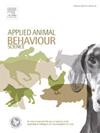Conditioning ostrich males to routine semen collection does not compromise their reproductive performance in a natural mating system
IF 2
2区 农林科学
Q1 AGRICULTURE, DAIRY & ANIMAL SCIENCE
引用次数: 0
Abstract
Studies have reported variation in semen quality between ostrich males, implying that selecting males based on superior semen characteristics could improve flock fertility. However, semen collection requires conditioning ostrich males to humans, which may allegedly interfere with natural courtship behaviour, hindering reproductive success. This study aimed to evaluate the reproductive success of ostrich males trained for semen collection using the dummy female method when placed in a natural mating system. Twelve males previously trained for semen collection and 12 untrained males were selected and paired with females for the duration of a natural mating season. Behavioural observations were conducted on the pairs, while eggs produced by the paired-off females were collected for artificial incubation. Fertility of eggs, hatchability and chick production were recorded as measures of reproductive performance. Males trained for semen collection did not interact differently with their female partners compared to untrained males, except for hissing, where trained males hissed more at their mates than untrained males. In addition, untrained males performed their territorial booming call more often than trained males. Neither copulation attempts nor successful copulations differed between trained and untrained males. No significant differences were recorded between the two groups of males in terms of fertility of eggs, hatchability and chick production. These results indicate that training males for semen collection does not alter their performance under a natural pair-mating system, suggesting that semen collection for quality evaluation before selection as breeding stock could be a viable method for improving flock fertility.
在自然交配系统中,对鸵鸟雄性进行常规精液采集并不影响其生殖性能
研究报告了鸵鸟雄性之间精液质量的差异,这意味着根据优良的精液特征选择雄性可以提高群的生育能力。然而,收集精液需要使鸵鸟雄性适应人类,这可能会干扰自然的求爱行为,阻碍生殖成功。本研究旨在评估在自然交配系统中使用虚拟雌性方法进行精液采集训练的雄性鸵鸟的繁殖成功率。选择12只受过精液采集训练的雄性和12只未经训练的雄性,在自然交配季节与雌性配对。研究人员对这些配对的雄蝶进行了行为观察,同时收集雌蝶产下的卵进行人工孵化。记录鸡蛋的受精率、孵化率和雏鸡产量作为繁殖性能的衡量标准。接受过收集精液训练的雄性与未经训练的雄性相比,与雌性伴侣的互动没有什么不同,除了嘶嘶声,受过训练的雄性比未经训练的雄性更容易对伴侣发出嘶嘶声。此外,未经训练的雄性比受过训练的雄性更频繁地发出领地鸣叫。在受过训练和未受过训练的雄性之间,交配的尝试和成功都没有差异。两组雄鸡在卵的受精率、孵化率和产蛋率方面均无显著差异。这些结果表明,在自然配对系统下,对雄性进行精液采集训练不会改变其性能,表明在选择种畜前进行精液采集质量评估可能是提高畜群生育能力的一种可行方法。
本文章由计算机程序翻译,如有差异,请以英文原文为准。
求助全文
约1分钟内获得全文
求助全文
来源期刊

Applied Animal Behaviour Science
农林科学-行为科学
CiteScore
4.40
自引率
21.70%
发文量
191
审稿时长
18.1 weeks
期刊介绍:
This journal publishes relevant information on the behaviour of domesticated and utilized animals.
Topics covered include:
-Behaviour of farm, zoo and laboratory animals in relation to animal management and welfare
-Behaviour of companion animals in relation to behavioural problems, for example, in relation to the training of dogs for different purposes, in relation to behavioural problems
-Studies of the behaviour of wild animals when these studies are relevant from an applied perspective, for example in relation to wildlife management, pest management or nature conservation
-Methodological studies within relevant fields
The principal subjects are farm, companion and laboratory animals, including, of course, poultry. The journal also deals with the following animal subjects:
-Those involved in any farming system, e.g. deer, rabbits and fur-bearing animals
-Those in ANY form of confinement, e.g. zoos, safari parks and other forms of display
-Feral animals, and any animal species which impinge on farming operations, e.g. as causes of loss or damage
-Species used for hunting, recreation etc. may also be considered as acceptable subjects in some instances
-Laboratory animals, if the material relates to their behavioural requirements
 求助内容:
求助内容: 应助结果提醒方式:
应助结果提醒方式:


